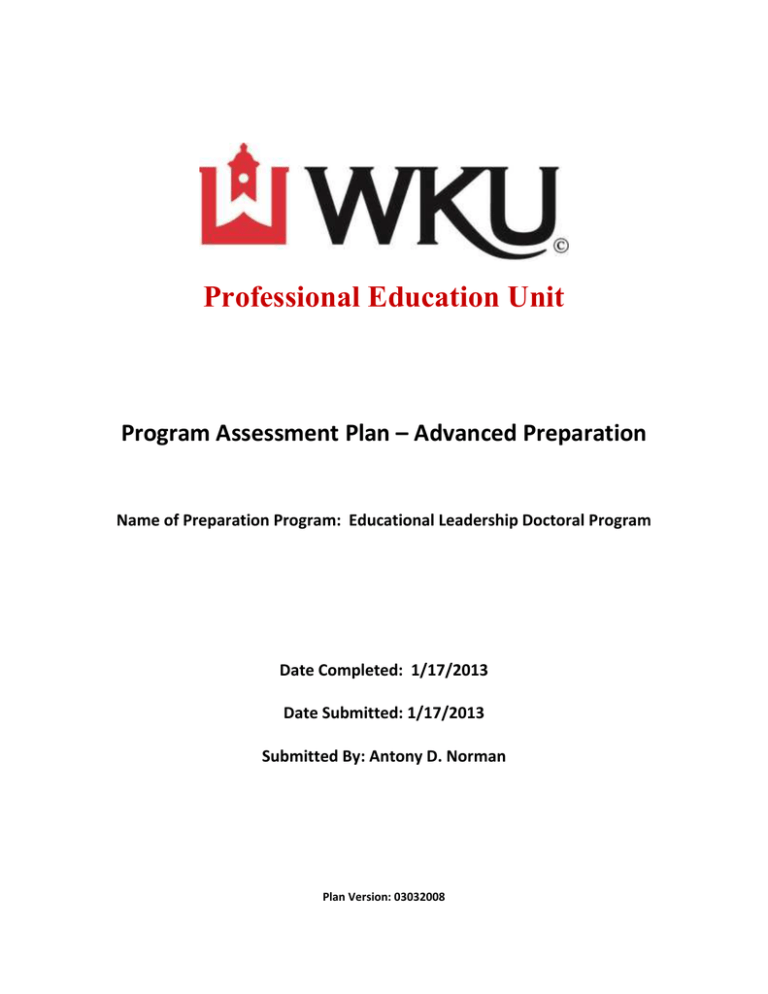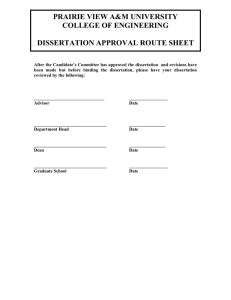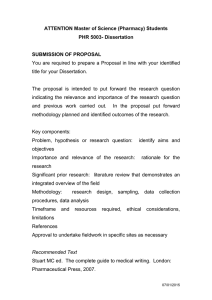Professional Education Unit Program Assessment Plan – Advanced Preparation
advertisement

Professional Education Unit Program Assessment Plan – Advanced Preparation Name of Preparation Program: Educational Leadership Doctoral Program Date Completed: 1/17/2013 Date Submitted: 1/17/2013 Submitted By: Antony D. Norman Plan Version: 03032008 Page 2 of 5 Critical Performance Assessment Alignment Matrix (Current: August 2012) Advanced Preparation Professional Education Program (Educational Leadership Doctoral Program) Courses EDLD 702 I II Visionary Leader Curricular Leader EDLD 732 Program Evaluation Plan Alignment Collaborative Leader V VI Ethical Leader Political Leader CITI Training Documentation Theory-Based Action Plan Qualifying Exam EDLD 799 Managerial Leader Professional Growth Plan EDLD 710 EDLD 712 EDLD 720 EDLD 722 EDLD 730 EDAD 798 Learned Society Standards (ISLLC) III IV Mini Lit Review Theory-Based Action Plan Theory-Based Action Plan Program Evaluation Plan Program Evaluation Plan Research Proposal EDD Form 6 (Dispositions) Questions 1 & 2 EDD Form 6 Dissertation Dissertation 7,9 1,2,3,5 EDD Form 6 Dissertation Dissertation 4,6 8 Kentucky Teacher Standards Program Evaluation Plan EDD Form 6 (Dispositions) Dissertation Dissertation 10 10 Faculty members associated with the WKU Educational Leadership Doctoral Program identified the following student learning outcomes aligned with ISLLC Standards: Intended Educational Outcomes ISLLC 1a. Demonstrates behaviors of a visionary leader by developing, articulating, and implementing a vision focused on improved student learning 1 and achievement (or client success) that is shared and communicated by a group or organization 1b. Demonstrates and documents a commitment to professional growth and development 1 2a. Designs plans and strategies for systemic reform that result in measurable improvements in student achievement (or client success) 2 2b. Designs and evaluates strategies and structures to document system and student achievement (or client success) accountability goals 2 3. Designs and defends resource allocation plans and decisions to maximize system performance as aligned with vision and improvement plans 3 4a. Demonstrates effective leadership strategies that improve systems and increase performance by measuring and enhancing the culture and 4 climate of a group or organization 4b. Demonstrates valuing of diversity by identifying and collaborating through diverse teams in response to diverse interests and needs identified 4 5. Demonstrates and discusses a personal code of ethics 5 6. Documents plans and actions taken to impact and influence the larger policy environment including the political, social, economic, legal, and 6 cultural contexts Page 3 of 5 Courses 1 Research Design EDLD 712 EDLD 722 Technology Educational Leadership Research Standards 3 4 Instrumentation and Data Collection Data Analysis 5 6 Program Evaluation Professional Scholarship Mini Lit Review EDLD 732 Qualifying Exam EDLD 799 2 Mini Lit Review Research Proposal Program Evaluation Plan Research Proposal Dissertation Dissertation Research Proposal Program Evaluation Plan Program Evaluation Plan Dissertation Dissertation Question 2 Dissertation Dissertation Faculty members associated with the WKU Educational Leadership Doctoral Program identified the following research standard that students should achieve: Research Standards RESEARCH STANDARD 1 – RESEARCH DESIGN: The EdD program candidate identifies research problems, formulates questions, designs appropriate methods, and performs investigations that address questions important to advancing theory and practice in the professional specialty. RESEARCH STANDARD 2 - TECHNOLOGY: The EdD program candidate uses technology to support performing research in the professional specialty. RESEARCH STANDARD 3 – INSTRUMENTATION AND DATA COLLECTION: The EdD program candidate develops instruments, research protocols, and data collection strategies to conduct research related to practical research problems. RESEARCH STANDARD 4 – DATA ANALYSIS: The EdD program candidate performs data analysis to support research related to practical research problems. RESEARCH STANDARD 5 – PROGRAM EVALUATION: The EdD program candidate conducts and uses program evaluation to improve practices and inform decision making. RESEARCH STANDARD 6 – PROFESSIONAL SCHOLARSHIP: The EdD program candidate performs advanced scholarship, accesses sources of data, synthesizes ideas, and performs applications to theoretical and practical issues and problems relevant to the professional specialty. Page 4 of 5 Delineation of Unit/Program Transition Points – Advanced Preparation Transition Point 1: Admission to Doctoral Program Data Reviewed Admission Application Minimal Criteria for Admission/Continuation Review Cycle Master’s level degree (transcripts) GRE Biannually Personal Statement Current Resume/Vita Letters of Recommendation (3) Transition Point 2: Admission to Final Experience (Candidacy & Dissertation) Review Data Reviewed Minimal Criteria for Continuation Cycle Critical Performance/Disposition Scores Qualifying Exam Graduate Studies Form C Data Reviewed Dissertation Graduate Studies Form E Final GPA 3.0+ Overall Average 3+ Overall Evaluation Approved Form C Research Tool 3.0+ GPA Transition Point 3: Program Exit Minimal Criteria for Exit Successful Defense and Submission Successful Dissertation Defense 3.0+ Final GPA Reviewed By EDD Admission Committee Reviewed By Each semester Dissertation Committee & Graduate Studies Review Cycle Reviewed By Each semester Dissertation Committee & Graduate Studies Remediation Opportunities: TP 2: Candidates may request additional instruction from faculty and may resubmit Critical Performances in order to improve their scores. Candidates may retake Qualifying Exams. TP 3: Candidates may request additional instruction from faculty and may resubmit Dissertation. Annual Program Assessment Report Outline (Due September 15) Academic Year __________ 1. Present your continuous assessment results in the following areas: a. Admission Data b. Course Based Assessment Data c. Clinical Experiences Data – Be sure to include dispositions assessment results, P-12 student diversity statistics, and results of efforts to ensure all candidates work with diverse students. d. Culminating Assessment Data – Be sure to include impact on P-12 student learning data. e. Exit and Follow Up Data 2. Summarize the above results by Kentucky Teacher (Initial Programs) OR Program Standards (Advanced Programs) AND other key Conceptual Framework values. Be sure to describe what the results tell you about your candidates’ progress toward/proficiency on each standard/CF value. 3. Summarize your efforts to report and disseminate your results (Unit/College-wide meetings, department/program level meetings, written reports, presentations, etc.). 4. Summarize key discussions and/or decisions made based on assessment results: a. Describe any assessment or data collection changes you have made/will make based on your assessment results. b. Describe any program curriculum or experience changes you have made/will make based on your assessment results. c. Describe any decisions about group/individual student progress you have made/will make based on your assessment results.


